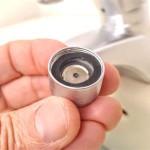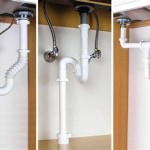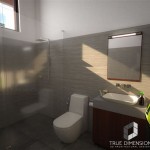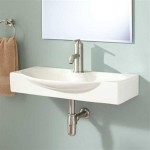Best Bathroom Sink Material for Hard Water
Hard water presents unique challenges for bathroom fixtures, particularly sinks. The high mineral content, primarily calcium and magnesium, leads to scale buildup that can dull the appearance of sinks, making them difficult to clean and potentially causing long-term damage. Selecting the right sink material is crucial for maintaining a clean and aesthetically pleasing bathroom in areas with hard water. This article explores various bathroom sink materials and their suitability for resisting the effects of hard water.
Understanding the Impact of Hard Water on Sink Materials
Hard water's impact stems from the dissolved minerals that precipitate out of the water solution as it evaporates. This precipitation manifests as a white, chalky residue known as limescale. Limescale adheres to surfaces, especially those in frequent contact with water. In bathroom sinks, this buildup occurs around the drain, on the faucet, and across the sink's basin. Over time, limescale can become difficult to remove, requiring harsh cleaning agents and abrasive scrubbing, which can damage certain sink materials.
Porous materials are more susceptible to hard water staining and buildup because the minerals penetrate the surface. Smooth, non-porous materials offer better resistance as they prevent minerals from embedding themselves. The chemical reactivity of the material also plays a role. Certain materials may react with the minerals in hard water, leading to etching or discoloration.
Sink Material Options: Durability and Resistance to Hard Water
Several materials are commonly used for bathroom sinks, each with its own advantages and disadvantages when exposed to hard water. This section will examine the most popular options in detail.
Porcelain: Porcelain is a classic choice for bathroom sinks known for its durability and smooth, glossy finish. It is typically made from a ceramic base fired at high temperatures, resulting in a non-porous surface. Porcelain is relatively resistant to staining and scratching, making it a good option for areas with hard water. However, porcelain is prone to chipping if subjected to impact. While hard water scaling can occur on porcelain, it's generally easy to clean with mild detergents and vinegar solutions.
Vitreous China: Vitreous china is a type of porcelain that has been glazed with a vitreous enamel. This glazing process makes it even more durable and resistant to staining and bacteria. Vitreous china is less likely to stain or scratch compared to standard porcelain, making it a preferable choice for bathrooms with hard water. The smooth, non-porous surface prevents minerals from penetrating, making cleaning easier.
Stainless Steel: Stainless steel sinks are recognized for their modern look and exceptional durability. They are highly resistant to staining, scratching, and heat, making them a versatile choice for various bathroom styles. While stainless steel doesn't stain easily from hard water deposits, water spots can be visible. Regular cleaning with stainless steel cleaner can prevent these spots and maintain the sink's shine. The non-porous nature of stainless steel makes it a hygienic option, as it doesn't harbor bacteria.
Solid Surface: Solid surface materials, such as Corian or Swanstone, are made from a blend of acrylic polymers and natural minerals. These sinks are non-porous and seamless, making them highly resistant to staining, mold, and bacteria. Hard water buildup is less likely to occur on solid surface sinks compared to porous materials. However, solid surface sinks can be susceptible to scratches and heat damage. Routine cleaning with mild soap and water is typically sufficient to remove any hard water residue.
Glass: Glass sinks are a contemporary option known for their unique aesthetic appeal. They are typically made from tempered glass, which is durable and resistant to shattering. Glass is non-porous, making it resistant to staining and easy to clean. However, glass sinks are prone to water spots and fingerprints, which can be more visible in areas with hard water. Regular cleaning with glass cleaner is necessary to maintain their appearance. The transparency of glass can also make any underlying buildup more noticeable. Scratches are also a potential issue with glass sinks.
Stone (Granite, Marble, Travertine): Natural stone sinks offer a luxurious look but require more maintenance than other materials. Granite is relatively durable and resistant to staining when properly sealed. Marble, on the other hand, is more porous and susceptible to staining and etching from acidic cleaners. Travertine is even more porous than marble and requires frequent sealing to prevent water damage. Hard water can leave mineral deposits and stains on stone sinks, especially if they are not properly sealed. Regular sealing is essential to protect these materials from water damage and staining.
Cast Iron with Enamel Coating: These sinks combine the durability of cast iron with the visual appeal of an enamel finish. The enamel provides a smooth, non-porous surface that is relatively resistant to staining. However, the enamel can chip or scratch, exposing the cast iron underneath, which can rust. Hard water can lead to scaling on the enamel surface, but it is generally easy to clean. Regular maintenance and care are essential to keep the enamel in good condition.
Key Factors in Choosing a Sink for Hard Water Conditions
Selecting the best bathroom sink material for hard water involves considering several key factors that extend beyond mere aesthetic appeal. Prioritizing these factors ensures long-term satisfaction and minimizes the challenges associated with hard water exposure.
Material Porosity: As previously mentioned, porosity is a crucial factor. Opting for non-porous materials like vitreous china, stainless steel, or solid surface is generally advisable. These materials resist the penetration of minerals, simplifying cleaning and reducing the risk of permanent staining.
Surface Smoothness: Smooth surfaces are easier to clean and less prone to hard water buildup. Look for sinks with polished or glazed finishes, as these tend to repel water and minerals more effectively. Avoid materials with textured or matte finishes, as these can trap mineral deposits and make cleaning more difficult.
Chemical Resistance: Some cleaning agents designed to remove hard water stains can be harsh and damaging to certain sink materials. Choose a sink material that is resistant to chemicals, particularly acids, to prevent etching or discoloration. Stainless steel and solid surface materials generally offer good chemical resistance.
Maintenance Tips for Bathroom Sinks in Hard Water Areas
Regardless of the sink material chosen, implementing a regular maintenance routine is crucial to mitigate the effects of hard water and prolong the sink's lifespan. Consistent cleaning habits and preventative measures can significantly reduce the accumulation of limescale and maintain the sink's aesthetic appeal.
Regular Cleaning: Clean the sink regularly with mild soap and water. This helps prevent the buildup of hard water deposits. Avoid using abrasive cleaners or scouring pads, as these can scratch or damage the sink's surface. A soft cloth or sponge is generally sufficient for routine cleaning.
Vinegar Solution: For stubborn hard water stains, use a solution of equal parts white vinegar and water. Apply the solution to the affected area and let it sit for 15-20 minutes before wiping it clean. Vinegar is a natural acid that can help dissolve mineral deposits without damaging most sink materials. However, avoid using vinegar on natural stone sinks, as it can etch the surface.
Water Softener Installation: Consider installing a water softener for the entire house. Water softeners remove the minerals that cause hard water, preventing scale buildup on all plumbing fixtures, including bathroom sinks. While this is a more significant investment, it can save time and effort in the long run by reducing the need for frequent cleaning.
Drying the Sink: After each use, dry the sink with a clean cloth. This prevents water droplets from evaporating and leaving behind mineral deposits. This simple step can significantly reduce the accumulation of hard water stains.
Protective Coatings: Consider applying a protective coating to the sink's surface. These coatings can help repel water and prevent mineral deposits from adhering to the material. Follow the manufacturer's instructions for application and maintenance.
By carefully considering the properties of different sink materials and implementing a diligent maintenance routine, homeowners can effectively combat the challenges of hard water and maintain a clean and aesthetically pleasing bathroom environment.

Best Bathroom Materials When You Have Hard Water
Bathroom Sink Material Guide Signature Hardware

Best Bathroom Materials When You Have Hard Water
Bathroom Sink Material Guide Signature Hardware
14 Best Kitchen Sink Materials For Ultimate Durability Style Vevano
Bathroom Sink Material Guide Signature Hardware

Best Bathroom Sink Material Types Of Materials
Bathroom Sink Material Guide Signature Hardware
-2.13.jpg?strip=all)
Best Bathroom Sink Material Types Of Materials

Common Sink Sizes How To Choose The Right Bathroom 2024
Related Posts







